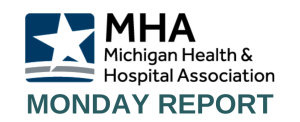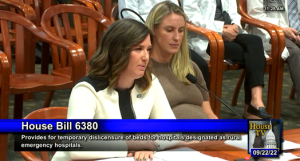


Affordable Care Act State Codification – Signed by the Governor
The legislature acted on a group of bills that add protections found in the Affordable Care Act to Michigan law. Governor Whitmer signed House Bills (HBs) 4619-4623 and Senate Bills (SBs) 356-358 into law and they are now Public Acts (PAs) 156-163 of 2023. These new laws memorialize important protections for Michiganders such as no-cost essential services, including preventive, mental health and emergency services. The MHA supported this bill package throughout the legislative process.
Violence Against Healthcare Workers – Awaiting Governor’s Signature
HBs 4520 and 4521, which increase the penalties for assaulting a healthcare worker, are headed to the governor’s desk to be signed into law. These bills are a positive step in ensuring violence against healthcare workers is not tolerated. The MHA continues to work on more opportunities to protect the healthcare workforce from violence in the workplace.
Auto No-Fault Updates – Passed the State Senate
The MHA continues to advocate for targeted updates to the state’s auto no-fault insurance law. SBs 530 and 531 passed the Senate and were referred to the House Insurance and Financial Services Committee. The MHA supports the changes proposed in this legislation, including moving reimbursement rate tiers back to the 2021 levels, smoothing the indigent volume factor timeline and creating an appropriate definition of Medicare rates for the purpose of auto no-fault insurance claim reimbursement.
Telemedicine Access – Passed the State House
HBs 4131, 4213, 4579 and 4580, which provide payment parity for telehealth services and provide limitations on the ability of health plans to dictate site specific visit requirements, were voted out of the House. The MHA supported the bipartisan package, which codifies many provisions in place during the public health emergency (PHE). The legislation makes additional changes to support the provider ability to serve patients and protect in-person visits that are vital to health outcomes. The bills were referred to the Senate Health Policy Committee.
Sharps Containers – Passed the State Senate
The Senate unanimously passed SB 482, which lifts the state’s 90-day disposal requirement for sharps containers. The MHA membership voiced concerns about the 90-day disposal requirement, which mandated sealing and disposing of containers before they reach their ¾ fill mark. The FDA regulated containers are costly and difficult to obtain, as hospitals experienced following a manufacturing facility fire. Disposal of partially full containers contributes to unnecessary and preventable medical waste. The MHA worked directly with the bill sponsor, Sen. Kristen McDonald Rivet (D-Bay City), on this legislation to address concerns about cost, access and environmental impact. The MHA supports this important policy change that will directly benefit the membership.
Behavioral Health Parity – Passed the State Senate
The Senate approved SB 27, which would ensure behavioral health parity laws are meaningfully applied at the state level, with a strong bipartisan vote. The MHA-supported legislation was referred to the House Health Policy Committee. Similarly, the House Health Policy Committee reported out HB 4707, which would specify behavioral health parity, in addition to other services that would be required to be covered. HB 4707 awaits a vote by the full chamber.
Maternal and Infant Health – Passed Committee
HBs 5167-5173, which present several opportunities to support maternal and infant health, were reported out of the House Health Policy Committee. The MHA worked closely with the bill sponsors and committee chair on the legislative language and supports several bills in the package, including:
- HBs 5167 and 5168, which allow for coverage of blood pressure monitors by commercial insurance and Medicaid for individuals who are pregnant or within the postpartum period.
- HB 5169, which allows for mental health screenings to take place in postpartum follow up and pediatric settings when clinically appropriate. This bill was paired with HBs 5170 and 5171 that require insurance coverage for those screenings.
- HB 5172, which sets up an opportunity for the state to publish maternal levels of care verifications and offer incentive payments for participation in verification and safety bundle utilization.
This package of bills awaits a vote by the full House and further legislative action is anticipated in the new year.
Rare Disease Advisory Council – Reported out of Committee
The Senate Health Policy Committee reported out HB 4167, which creates the Rare Disease Advisory Council, after being approved by the full House earlier in the year. The MHA supports this legislation and expects further action on it in 2024.
Breast Milk Donor HIV Testing – Reported out of Committee
The House Health Policy Committee reported out HB 4728, which updates the requirements for testing a breast milk donor for HIV or an HIV antibody. The proposed legislation removes the requirement to test a donor quarterly, while retaining the requirement for initial testing for potential donors. The MHA supports this legislation. HB 4728 is awaiting a vote by the full House.
340B Contract Pharmacy Legislation – Introduced
MHA member covered entities continue to share concerns about manufacturer-imposed limitations on contract pharmacy arrangements. The MHA worked with Rep. Alabas Farhat (D-Dearborn) to introduce legislation prohibiting contract pharmacy arrangement discrimination. HB 5350 was officially introduced on the last day of session for the year and referred to the House Health Policy Committee.
Interstate Nurse Licensure Compact – Introduced
HB 4935, also known as the Michigan Nurse Licensure Compact (NLC), would enter Michigan into the national Nurse Licensure Compact. The NLC allows registered nurses to have one multistate license with the privilege to practice in their home state and other compact states. Permanent relocation to another compact state requires obtaining licensure in the new state, as the nurse’s residency has changed. HB 4935 would declare Michigan a compact participating state, allowing the mutual recognition of nursing licenses among the other member compact states. The bill was referred to the House Health Policy Committee.
Opposition to Repeal of Local Government Labor Regulatory Limitation Act
The Senate did not take a vote on SB 171, sponsored by Sen. Sean McCann (D-Kalamazoo). The bill repeals the local government labor regulatory limitation act, which prohibits localities from regulating employment relationships. Repealing this act would allow for a local unit of government to impose local labor ordinances such as a higher local minimum wage than the state, or potentially institute local staffing and scheduling regulations. The MHA and a coalition of other business and employer groups oppose this legislation over concerns of a patchwork of local regulations that could jeopardize access to healthcare services in Michigan.
Additional MHA Supported Legislation Signed by or Awaiting Signature from Gov. Whitmer
- SB 219 preserved many PHE flexibilities regarding vaccinations and testing services offered by a pharmacist at a local pharmacy. Michigan continues to see post-PHE declines in vaccination rates. Promoting increased access points for individuals to get vaccinated is a public health benefit and one the MHA supports. Gov. Whitmer signed SB 219 into law in late July 2023.
- HBs 4495-4496 cleaned up aspects of the Health Michigan Plan Act (HMP), including removal of cost sharing requirements that have proved to be exceedingly burdensome, and the elimination of language requiring the repeal of the HMP if state costs ever exceeded state savings. The HMP has increased access to healthcare throughout the state, providing coverage for over a million Michiganders. The MHA supported this legislation, which the governor signed into law in July 2023.
- HBs 4616 and 4617 prohibit mental health professionals from providing conversion therapy to a minor. The MHA supported the legislation, which Gov. Whitmer signed into law in August 2023 and are now PAs 117 and 118 of 2023.
- SB 384 and HBs 4362-4364 make positive changes to state law related to organ donation. SB 384 prohibits insurance discrimination against a living organ donor and HBs 4361-4364 allow for increased opportunities to identify as an organ donor. These changes have the potential to increase organ donation, helping the many individuals in need of transplants. The MHA supported this bill package which, Gov. Whitmer signed into law in November 2023. The bills are now PAs 100-102 and 192 of 2023.
- SB 227 will update the state’s child caring institution licensing laws to align with emergency intervention language used in the Mental Health Code. Specifically, this legislation is important to any facility interested in becoming licensed as a Pediatric Residential Treatment Facility (PRTF) and alignment between the Mental Health Code and the licensing structure for child caring institutions. SB 227 is headed to the governor’s desk for her signature.
- SB 133 would create the Overdose Fatality Review Act. The MHA worked closely with the bill sponsor to ensure language in the bill accurately includes and reflects the role hospitals play in their communities. The governor is expected to sign the bill into law soon.
- SB 410 rescinds limitations on products liability for drugs with FDA approval. The MHA supports SB 410 which Gov. Whitmer is expected to sign.
Information on healthcare bills proposed during the 2023-2024 legislative session can be found through the MHA state legislative bill tracker.
Members with questions on any of the bills should contact Adam Carlson or Elizabeth Kutter at the MHA.










